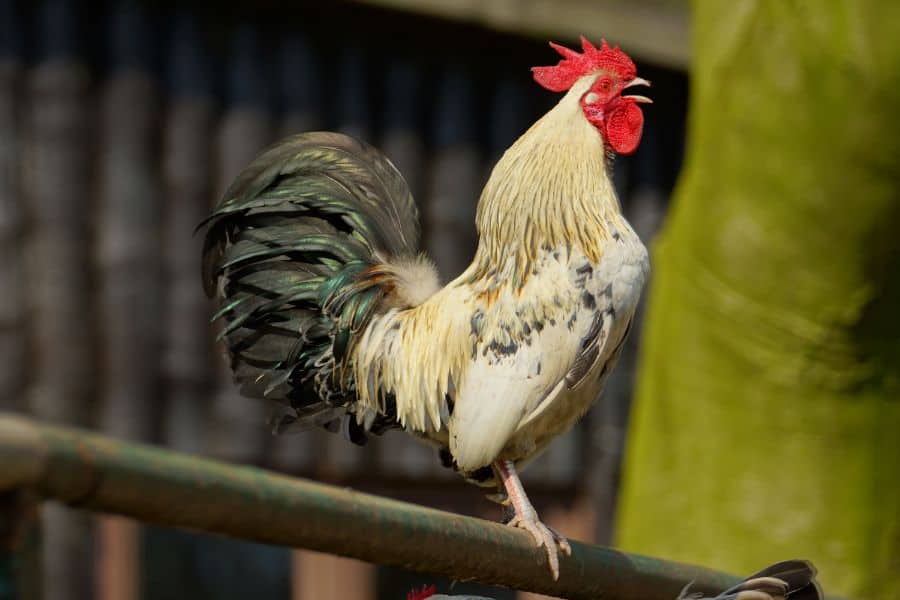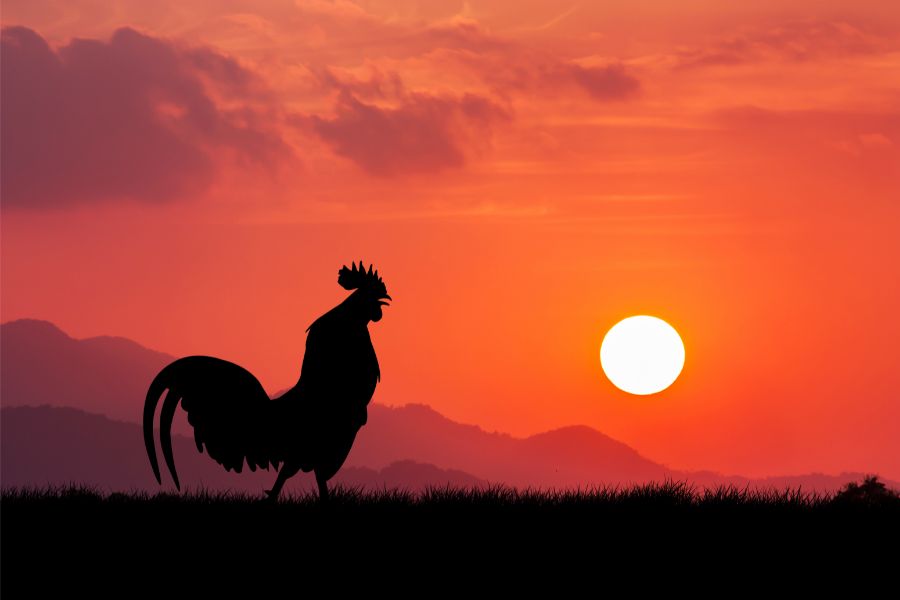Roosters can be helpful in keeping hens safe, and if you want to hatch your own chicks, keeping at least one rooster is essential.
However, the main problem with roosters – apart from their occasional aggressivity towards humans – is the noise they make. So in this post, we have all the info you need to know about roosters crowing to help you understand why they do it and how to shut them up!
Why Do Roosters Crow?
There are several reasons why roosters crow, and here are some of the most important.
To Wake up The Hens
Although roosters can and do crow at any time of the day, most people associate the crowing sound with the break of day.
This is because when the sun comes up – or even a little before – the rooster starts crowing to wake up all the hens and get them all up and ready to start foraging for the day.
In this way, when he crows in the morning, it’s a bit like ringing a bell to tell everyone to get out of bed for the start of the morning shift of work!
To Mark His Territory
Chickens are descended from wild junglefowl that originated in the forests of Southeast Asia, and in their natural habitat, roosters crow to mark their territory.
In the jungle, roosters who stray into another rooster’s territory might not see him at first due to the dense undergrowth, but by crowing, the occupant lets other potential rivals know that he is there so they won’t enter his territory unless they are ready for a fight.
This helps avoid conflict since a younger, less powerful rooster who hears his crowing will choose to avoid a bigger rooster rather than fight him, minimizing the risk of injury or death to them both.
In a domesticated setting, roosters aren’t usually in danger of challengers straying into their territory, but they still instinctively crow to mark their territory – and this may increase if they feel threatened or insecure for some reason.
Marking a rooster’s territory is also another reason for early morning crowing.
To Increase His Flock
Just as roosters in the wild crow to warn off other males, they also crow to invite new hens to come into their territory and join their flocks.
Again, in a domesticated setting, a rooster is unlikely to be able to attract new hens to his flock in this way – but if he is unsatisfied with the number of hens he has, his instinct is to crow to try to increase the size of his flock.
To Assert His Dominance
If you keep more than one rooster, the top bird will use his crowing to assert his position of dominance.
You may notice that there is a strict order in which your roosters crow, and the dominant male will always crow first – and if another rooster starts crowing before him, it will be considered a challenge to his authority and may result in conflict.
In normal circumstances when he feels secure in his position, a rooster might not feel the need to crow excessively for this reason.
However, if he is unsure of himself, he is likely to crow more. This is a way of keeping any other roosters in their place while also issuing a challenge that if any other male feels he can usurp the position as top bird, then he should step up and try it on.
To Protect His Flock and Warn of Danger
Other than mating with hens and fertilizing their eggs, one of the most important roles a rooster plays is looking after his flock.
He keeps a lookout for predators or any other danger, and when he notices anything he doesn’t like, he’ll start crowing to let the hens know that danger is approaching.
For this reason, even if you don’t plan to hatch chicks, it can be useful to keep a rooster with your hens because he will aid you in taking care of them and protecting them from danger.
Sometimes, you may hear a rooster crowing in the middle of the night, and this is not normal because this is the time when all your chickens, both hens and roosters, should be sleeping.
As a result, if a rooster crows during the night, it means there is some kind of problem – and one likely possibility is the presence of a predator.
This means if you hear your rooster crowing during the night, it might be a good idea to get up and check what’s wrong. And since the rooster acts as a kind of nighttime predator alarm system in this way, it’s another good reason for keeping a rooster to help keep your hens safe.
To Tell You They’re Hungry or Thirsty
Roosters often crow when something is wrong, and if it’s not because there’s a predator around, it could be because they have nothing to eat or drink.
In a way, your rooster is telling you to come out and feed and water his hens – if you keep a rooster, you’ll soon learn who the boss in your yard really is!
Because He Has Nothing to Do
Finally, roosters can crow simply because they’re bored. Often, people think of chickens as dumb animals, but they’re much more intelligent than many people give them credit for – and if they don’t have things to keep them stimulated, they can easily get bored.
Boredom in chickens can manifest itself in a variety of ways such as pecking at each other or pulling their coop apart – and in roosters, crowing is also a sign of boredom.
How Often Do Roosters Crow?
So as we’ve seen, roosters crow for many reasons, and how often they crow depends on the presence or absence of the stimuli that set them off.
Most roosters will crow first thing in the morning to mark their territory and to wake up the hens and get them out foraging, but after that, some will crow throughout the day while others will hardly crow at all.
Generally speaking, roosters only crow when they need to – they don’t do it just for fun.
What this means is that a happy and secure rooster who has a good-sized flock and doesn’t feel under threat from challenges to his position or predators won’t crow very often. However, if he is more insecure for various reasons, he is likely to crow much more.
Similarly, the duration of his crowing can vary for the same reasons. For example, if predators are constantly on the prowl around his territory, he is likely to crow much more than if he feels safe.
How Do Roosters Produce Their Sounds (Anatomically)
The mechanism by which roosters crow is the same that all birds use to vocalize. The internal body part that they use to crow is called the syrinx.
The syrinx is located where the chicken’s windpipe branches into the two before going to the lungs. Two membranes (called tympanic membranes) form the walls of the syrinx and it is these two that are vibrated to produce the sounds made by roosters.
The quality of the sound produced is controlled by varying the tension of the tympanic membranes.
And at point-blank range, a rooster’s crow can reach around 130 decibels, which is equivalent to the volume of a jackhammer or a jet engine from a close distance.
An interesting fact about rooster anatomy is that their auditory canal closes when their beak is open. This is one of the mechanisms that protect them from losing their hearing when they crow as loudly as they do.
How Do Roosters Know When To Crow?
Another interesting mystery about roosters that persisted for centuries was how they were able to keep time. If you monitor your roosters, you’ll notice that they usually start crowing at roughly the same time every morning.
In 2013, this mystery was solved by researchers from Japan. In a series of tests that involved keeping the roosters in total darkness for long periods of time, they noticed that even in such an environment, the crowing of the roosters would peak during a specific period, 24 hours apart.
This meant that it was the roosters’ inner circadian rhythm and not external stimuli that told them when it was time to crow in the morning. However, it was also noticed that too much time in the dark interfered with their circadian rhythms resulting in less regular crowing.
But why do roosters have this biological clock, and how does it work? Scientists still need to do more research to find out.
How Can You Stop a Rooster from Crowing?
One of the most common – and important – questions people ask about keeping roosters is how you can get them to shut up, and what should be clear by now is that the key is removing the stimuli that set them off. Here are some things you can try:
- Add hens to the flock: Giving a rooster more hens to look after will make him more satisfied and less likely to crow.
- Remove hens from the flock: Conversely, if you have only one rooster looking after a very large flock of hens, it could make him feel insecure. As a result, removing hens from a large flock can have the desired result.
- Only keep one rooster: Crowing may be the result of a power struggle between roosters, so keeping just one may mean he crows less.
- Keep the rooster separate from the hens: Keep your rooster separate from your hens until he is required for breeding and he may crow less.,However, this may also make him crow more because he’s trying to attract a flock, so it’s something to experiment with.
- Check for predators: Make sure no predators are present – either perceived or real – and your rooster won’t need to crow as much.
- Make sure your flock is properly fed and watered: If you make sure your flock is always properly fed and watered, this will remove one of the reasons for a rooster to start crowing.
- Keep him busy: Give your birds treats like corn on the cob that will keep them busy. While your rooster is pecking at the treats, he won’t be thinking about crowing.
- Use a rooster collar: Finally, if you have a problem rooster, you can try fitting a rooster collar to reduce his crowing. They work by restricting the airflow in the rooster’s throat to reduce the volume. However, this is a bit extreme, and some people see it as slightly inhumane.
Also Read: What Are Rooster Spurs?
FAQs
Why Do Roosters Crow in The Morning?
Roosters crow first thing in the morning to wake up the hens and let them know that the morning shift of foraging is about to start. They also instinctively crow to mark their territory.
Why Do Roosters Crow All Day?
If a rooster crows all day, it can be for a number of reasons, but generally speaking, it means that something is not right. This means to get him to stop, you need to work out what is making him crow and then fix it.
Are All Breeds the Same?
No, not all breeds are the same. Some breeds crow more than others, and some breeds are also louder than others.
For example, bantam cochins might puff up their chests and crow with gusto – but the sound that comes out is usually quite pathetic.
When Do Roosters Start Crowing?
Although it can depend on the individual bird, generally speaking, roosters begin crowing from when they reach around four of five months old. However, in some roosters, it can take a little longer before they start.
Also, when they start, they don’t usually go from absolute silence to a full-throated crow in one go, and usually it takes them a while to build up to a proper crow, just like a human baby learning to talk!
What Does It Mean if A Rooster Doesn’t Crow?
If a young rooster doesn’t crow, it might mean he’s just not ready yet and that he will start crowing as he grows older.
However, if a rooster that previously crowed falls silent, it could mean he is ill, injured, being bullied or simply getting old.
Can Hens Crow?
Yes. Hens are physically capable of crowing, and sometimes they do. However, it is not so common, and even if they crow, they do so far less than roosters.
Minimize Crowing by Removing Stimuli
Although you might think that roosters crow just to drive you and your neighbors crazy, there are actually several good reasons why they crow, and understanding these reasons will help you encourage them to crow less.
The key is working out why a particular rooster is crowing so much and then removing the stimuli – after which, you will probably find that he starts crowing much less.


